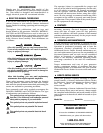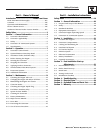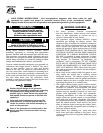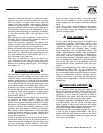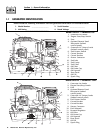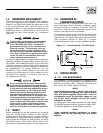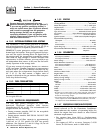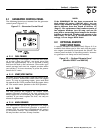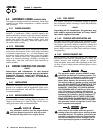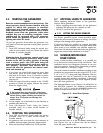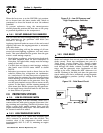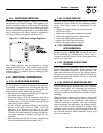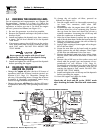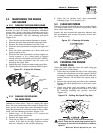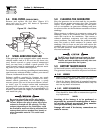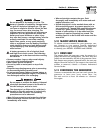
8 Generac
®
Power Systems, Inc.
Section 2 – Operation
PRIMEPACT 50 Recreational Vehicle Generator
2.3 AUTOMATIC CHOKE (GASOLINE ONLY)
The engine is equipped with an automatic choke that
consists of two main components: a choke solenoid
and prechoke.
2.3.1 CHOKE SOLENOID
During engine cranking (Start/Stop switch at
START), a solid-state choke module signals the
choke solenoid to activate and cycle (choke on/choke
off) until the engine starts. The choke solenoid thus
opens and closes the carburetor choke valve only
when the engine is cranking. When the engine starts,
the choke stops cycling.
2.3.2 PRECHOKE
The choke system also has a temperature-sensitive
metal strip that adjusts choke valve angle according
to ambient temperatures (i.e., in cold ambient tem-
peratures, choke valve closes more). Once the engine
starts, an element heats the temperature-sensitive
strip to a normal operating condition, opening the
choke valve. This may take about three minutes in
cooler weather.
2.4 BEFORE STARTING THE ENGINE
NOTE:
Instructions and information in this manual
assume the generator has been properly installed,
connected, serviced, tested and adjusted by a
qualified installation technician or installation
contractor.
2.4.1 INSTALLATION
Generator installation must have been properly com-
pleted so it complies with all applicable codes, stan-
dards and regulations and with the manufacturer's
recommendations.
2.4.2 ENGINE LUBRICATION
Have the engine crankcase properly serviced with the
recommended oil before starting. Refer to Section 1.5.4
(Page 6) and Sections 3.1 and 3.2 (Page 12) for oil ser-
vicing procedures and recommendations.
Any attempt to crank or start the engine before
you have properly serviced it with the recom-
mended oil may result in an engine failure.
2.4.3 FUEL SUPPLY
The engine must have an adequate supply of proper
fuel to operate. Before starting it, check that sufficient
fuel is available.
NOTE:
Depending on the installation, the generator may
have either a separate fuel tank, or it may “share”
the vehicle engine’s fuel tank.
2.4.4 COOLING AND VENTILATING AIR
Air inlet and outlet openings in the generator com-
partment must be open and unobstructed for contin-
ued proper operation. Without sufficient cooling and
ventilating airflow, the engine/generator quickly over-
heats, which causes it to shut down and may damage
the generator.
2.4.5 ENGINE EXHAUST GAS
Before starting the generator engine, you should be
sure there is no way for exhaust gases to enter the
vehicle interior and endanger people or animals.
Close windows, doors and other openings in the vehi-
cle that, if open, might permit exhaust gases to enter
the vehicle.
The generator engine releases DEADLY carbon
monoxide gas through its exhaust system. This
dangerous gas, if breathed in sufficient concen-
trations, can cause unconsciousness or even
death. Never operate the generator set with
the vehicle inside any garage or other enclosed
area. DO NOT OPERATE THE GENERATOR IF THE
EXHAUST SYSTEM IS LEAKING OR HAS BEEN
DAMAGED. SYMPTOMS OF CARBON MONOX-
IDE POISONING ARE (a) inability to think coher-
ently, (b) nausea, (c) vomiting, (d) twitching
muscles, (e) throbbing temples, (f) dizziness, (g)
headaches, (h) weakness, and (i) sleepiness. IF
YOU EXPERIENCE ANY OF THESE SYMPTOMS,
MOVE INTO FRESH AIR IMMEDIATELY. IF SYMP-
TOMS PERSIST, GET MEDICAL HELP. Shut down
the generator and do not operate it until it has
been inspected and repaired.
Never sleep in the vehicle while the genset is
running unless the vehicle has a working carbon
monoxide detector. The exhaust system must be
installed in accordance with the genset installa-
tion manual. Make sure there is ample fresh air
when operating the genset in a confined area.
!
DANGER
!
DANGER
◆
◆
◆
!
◆
◆
◆
◆



